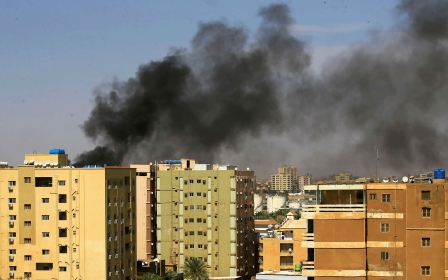'The revolution continues': Sudanese protest against military takeover

Sudanese protesters rejecting a military takeover have been gathering for Friday prayers outside the country's defence ministry, where they defied a curfew set by the army with an overnight sit-in.
After months of protest against President Omar al-Bashir and brief celebrations over his removal from office on Thursday after 30 years in power, protesters and activists immediately rejected the announcement that the military would be taking control for a two-year "transitional period".
The military council responded on Friday by saying it would start talks with protesters, who demand a civilian handover, and said it was "not greedy for power".
"Let us work," said the head of the new ruling military council political committee, Omar Zeinalabdin, arguing that the army was working in the interest of the people and was not associated to Bashir's government.
He said the transitional period would be up to two years but could be as short as one month if it proceeds "without chaos".
"I urge the political leaders to seize this golden opportunity," he said.
Large tents were put up outside the defence ministry on Friday, as people brought in food and handed out water to the swelling crowd, a witness told the Reuters news agency.
Activists wearing yellow vests controlled traffic around the compound on Friday morning and managed foot traffic to and from the sit-in. They also blocked a major bridge in central Khartoum.
Much of the anger has been directed against Awad Ahmed Ibn Auf - the defence minister who is under United States sanctions and is seen as an accomplice of Bashir's - who announced the military takeover alongside a state of emergency and the dissolution of the constitution.
Awad Ahmed Ibn Auf leads a military triumvirate, alongside national intelligence and security service chief Salah Abdullah Gosh and leader of the Rapid Support Forces Mohamed Hamdan. All three have been connected to serial human rights abuses and are unacceptable to the opposition.
Anniversary sit-in
The sit-in began on Saturday outside the army headquarters when protesters marked the anniversary of the 1985 uprising that overthrew military ruler Gaafar Nimeiri - an anniversary that re-energised an anti-Bashir protest movement that had been going since December.
UN human rights chief Michelle Bachelet said on Friday that Sudan should release all imprisoned protesters and investigate the use of force by security forces.
The Sudanese Doctors' Association said that 13 people were killed on Friday, eight of them in Darfur, where Bashir's government and associated militias are accused of killing up to 400,000 people in the early 2000s.
The International Criminal Court issued a warrant for Bashir's arrest in 2010 based on allegations of war crimes in Darfur, and Bachelet said Sudan should now cooperate with the ICC in handing over the deposed president.
Ibn Auf was also sanctioned by the US Treasury for his own alleged role in war crimes in Darfur, including supporting and directing attacks by the Janjaweed militia.
US suspends talks
The United States said it was suspending talks with Sudan on normalising relations. The State Department ordered non-emergency US government employees to leave the country and warned Americans against travelling to Sudan amid "crime, terrorism, civil unrest, kidnapping and armed conflict".
The State Department, while declining to declare the takeover a coup, said Washington supported a peaceful and democratic Sudan and believed the Sudanese people should be allowed a peaceful transition sooner than two years from now.
"The Sudanese people should determine who leads them in their future," State Department spokesman Robert Palladino told a news briefing. "The Sudanese people have been clear that they have been demanding a civilian-led transition. They should be allowed to do so sooner than two years from now."
British Foreign Secretary Jeremy Hunt called for a "swift move to an inclusive, representative, civilian leadership," saying in a tweet that a "military council ruling for 2 years is not the answer".
In spite of the ICC arrest warrant over war crimes in Sudan - allegations which he has denied - Bashir defied the court by visiting several ICC member states. Diplomatic disputes broke out when he went to South Africa in 2015 and Jordan in 2017 and both failed to arrest him.
Bashir's downfall marked the second time this month that a leader in the region has been forced out after mass demonstrations. Algeria's ailing former president Abdelaziz Bouteflika, in power since 1999, stepped down on 2 April after six weeks of protests against him extending his rule.
Middle East Eye delivers independent and unrivalled coverage and analysis of the Middle East, North Africa and beyond. To learn more about republishing this content and the associated fees, please fill out this form. More about MEE can be found here.




